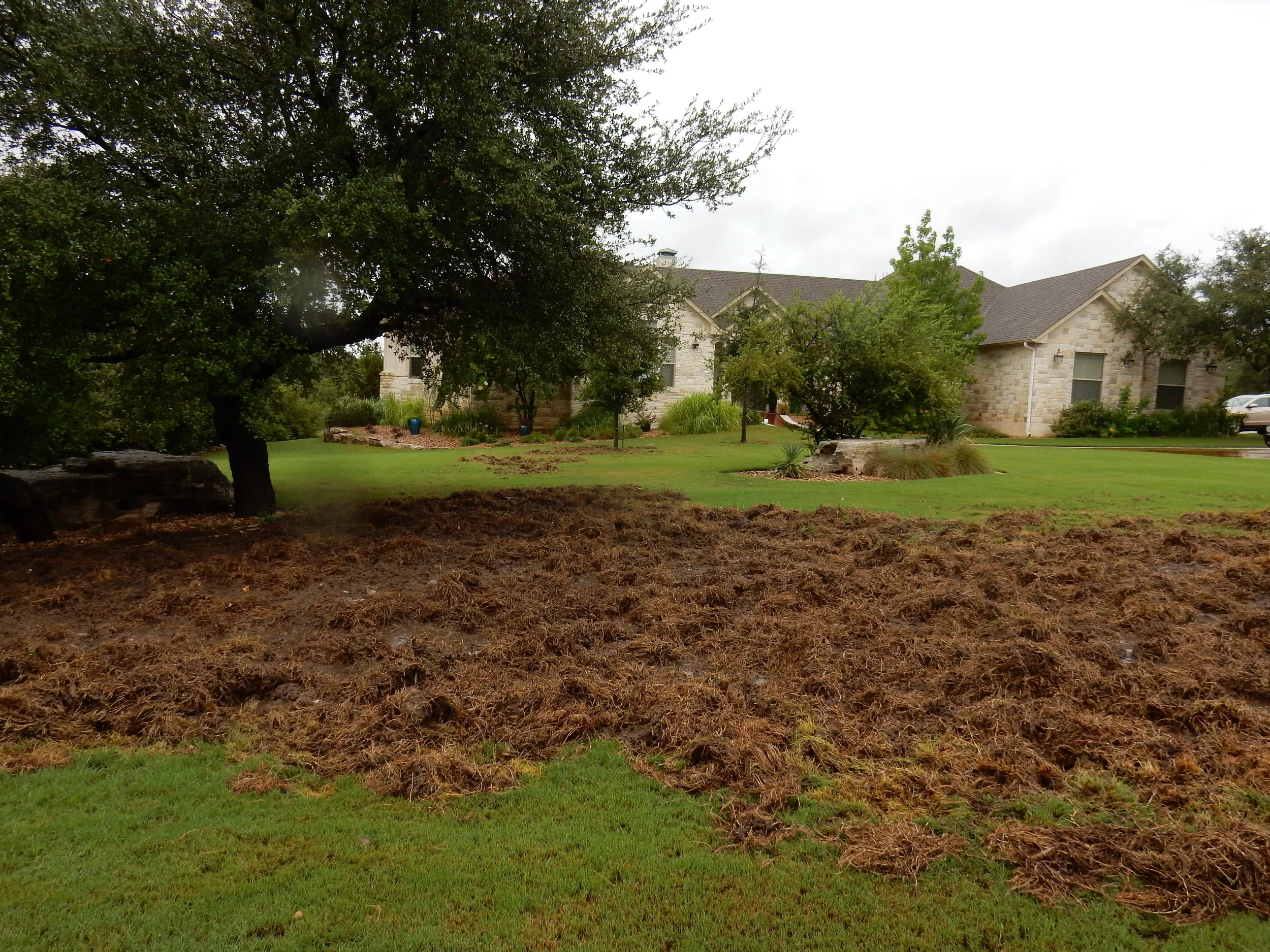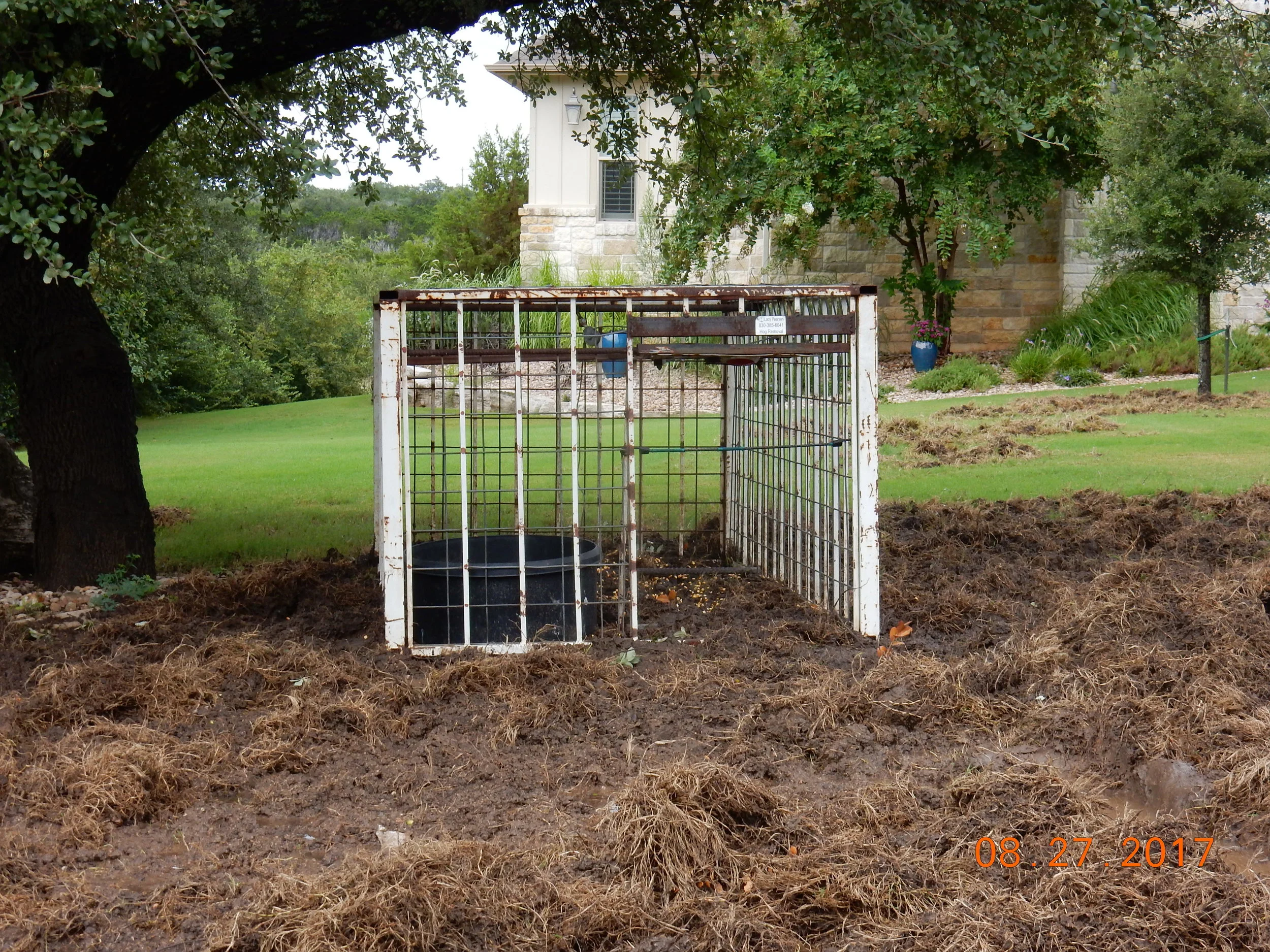“Are you going to the meeting with the hog trapper?” Curtis asks me.
He and Anna are staying with us because of Hurricane Harvey. Their neighbors have informed them that their Houston home isn’t under water, so they’re relieved about that. Now they’re anxious to get back to their own space, but heading in that direction at this point would be unthinkable.
On the other hand, the weather in Houston has resulted in a gentle rain for Marble Falls, a benign soaking at the end of a two-month drought. But just because we’re happy to have the rain doesn’t mean that if I walk up the street to talk about hogs, I won’t end up getting wet.
“I’m considering it,” I respond. “A person who traps hogs for a living is bound to be interesting. But what should I wear?” It’s not my appearance that concerns me; it’s the question of rain gear. Will an umbrella be enough, or should I don my quick-dry pants, hiking boots, and a poncho? It depends on so many things—the angle of the rain, the length of the meeting, the temperature.
“It’s wet out there,” he says. “I, too, am curious about catching hogs.”
"If you get wet you can always get dry again,” is David’s reasonable contribution.
Though the hog damage in our yard has been minimal, David has been concerned about the nighttime prowling of the hogs, especially after the destructive swine completely wiped out a neighbor’s lawn. Sad, too, because her grass was the greenest and most weed-free in the cul-de-sac.
Anna is reading and wants to stay dry, so she chooses not to meet the hog catcher, though she assures us that she's with us in spirit. At one o’clock David, Curtis, and I walk up the street and hang out in front of our neighbor’s savaged lawn. I decided that an umbrella is enough in the way of rain protection, though the lower portion of my jeans is already damp.
Always happy to help, David takes some pictures of the destruction. The homeowner and her boyfriend come out to greet us.
“I’m sorry about your lovely grass,” I tell her.
“I saw the hogs last night around ten. They’re big, like over two hundred pounds.” Using hand and arm gestures, she shows how tall they are, and how big around. “And then they were out here again this morning around five.”
She and her friend introduce themselves to Curtis. And I’m shallow enough to feel pride because he’s tall and broad-shouldered and is wearing a Columbia Law t-shirt.
The man who lives across the street meanders over.
“I want to meet this hog trapper,” he says.
Apparently we aren’t the only ones who are bored with playing backgammon and discussing the rain.
A big red truck drives by.
“I bet that’s him,” I say. He slows and looks at us but doesn’t stop. He's sporting a home-cut mullet. See? Intriguing from the get-go.
A friendly couple from further up the street arrives.
“I want to get a look at this hog trapper,” the wife says. “I have questions.”
“They’re hitting our grass every night,” the husband says. “But our damage isn’t as bad as this.” He looks at the pitiful state of the woman’s yard and shakes his head, which causes the rest of us to do the same. She’s going to have to redo her entire lawn.
The red truck pulls up again, this time from the opposite direction. Our hog trapper emerges, approaches, and introduces himself. We circle around him like he’s a celebrity. In addition to the disastrous hair, he wears a t-shirt with the sleeves cut out, making room for his fleshy biceps. The shirt says Port Aransas across the front, an indication that he stands in sympathy with the victims of Hurricane Harvey. Also, several of his front teeth are missing, a clue that he’s been in a bar fight or two.
“Oh yeah,” he says, shaking his head sadly as he views the plowed-up grass. “You got hogs alright.”
“How’s this going to work?” asks a neighbor.
“I’ll put out a couple of cages. I’ll give you my number and when you get one, give me a call and I’ll come get it. I have to come all the way from Burnet, so I won’t just stop by every day to check.” Burnet’s twenty minutes up the highway.
“What about other animals getting in the cages?” someone else asks.
“Oh, I’ve caught a deer or two, and you don’t want that. There’s a quick release. Just unhook the door and the deer’ll run on out.”
“How long will the cages be here?”
“A month should do it, just to make sure we got ’em all. I’ll just go get the traps now.”
He heads back to his truck, gets in, and drives away. The group disperses.
“I’m confused,” I say as the three of us head home. “If he was called here to set traps, why didn’t he bring the traps?”
“I guess he’s got his own way of doing things,” David says.
“Showing up to trap without the traps is inefficient.” Inefficiency disturbs me in all its forms.
“Maybe he came from somewhere else.” This from Curtis, who seems satisfied with the meeting. “He seems to know all about catching hogs.”
But I’m not satisfied. There are questions that weren’t asked and answered.
“How does he get a heavy hog out of the cage and to the meat processing plant?” I ask. “It’s not like he can just ask it nicely to please get in his truck. Also, what do they do with the meat? Do they call it local pork and ship it to the grocery stores? Or do they put it in dog food? And what drew the hogs here in the first place?”
“All will be made clear in time,” David philosophizes.
Huh. In order for this to be made clear I’ll have to observe this procedure from front to finish. Don’t lose sleep over this; when I find out how he gets the beasts from the cages to the slaughterhouse, and what they do with the meat, I’ll let you know.
Everything you're looking for in a real live hog trapper!
Look at the damage! You can tell by the grass that hasn't been ruined that this was a really nice lawn.
The cage. I'll post a picture on Facebook if they ever catch a hog.




